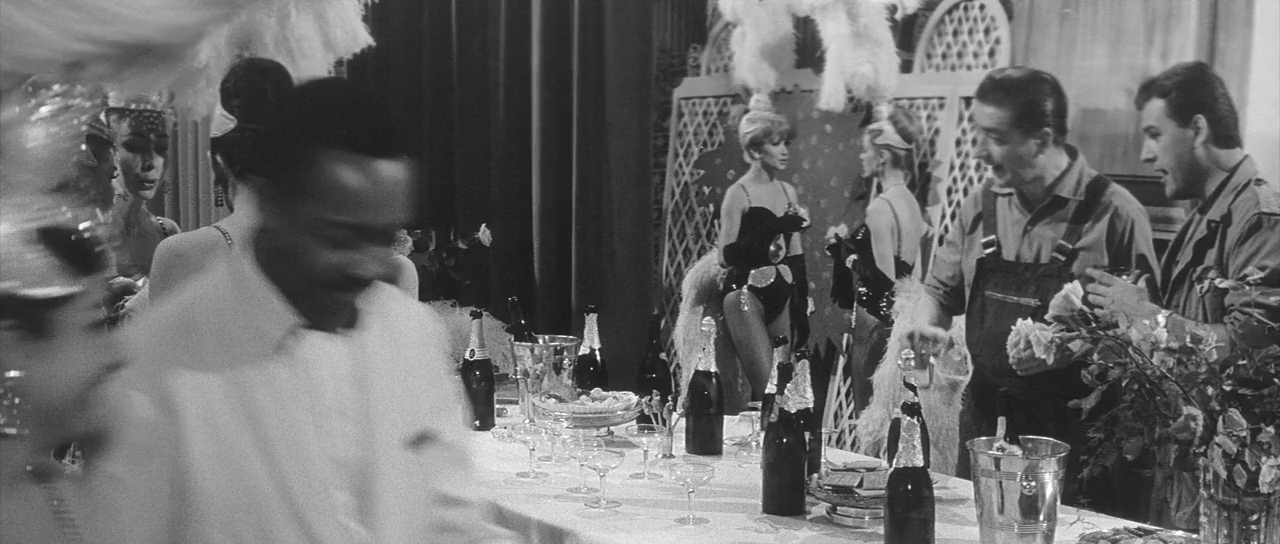– I saw you the other morning, eating frites. – I like frites.Bob le flambeur [Bob the Gambler] (Jean-Pierre Melville, 1956)
Jun
13
frites

Anne (Isabelle Corey), a cute blonde with a beret, eats a fry (French, obviously) while giving us a side glance. It's all very proto-Vague. DP: Henri Decaë.
paris
“I'd even lose at hopscotch these days.”Bob le flambeur [Bob the Gambler] (Jean-Pierre Melville, 1956)
Jun
13
Friday

Bob (Roger Duchesne) at the tables, gambling. DP: Henri Decaë.
An unlucky character on Friday the 13th
– Bob Montagné
Bob gambles, and always wins. But then he starts losing. And not just games.
“Soyez réalistes, demandez l'impossible”Grands soirs & petits matins [May Days] (William Klein, 1978)
May
24
1968

Sorbonne students discussing the political situation with an elderly Parisian man. DPs: William Klein & Bernard Lutic.
– May 68 slogan
“Hélène Picard, born in Lyon, May 20, 1943. A child in care, she is reported as a runaway, a thief and unstable.”La Femme Bourreau [A Woman Kills] (Jean-Denis Bonan, 1968)
May
20
1943

A dark-haired woman lounging on a bed. DP: Gérard de Battista.
“One must confront vague ideas with clear images” La Chinoise, ou plutôt à la Chinoise: un film en train de se faire [La chinoise] (Jean-Luc Godard, 1967)
Mar
19
Howard University Protest

Yvonne (Juliet Berto) holed up behind piles of Mao's Little Red Book, wielding a machine gun. DP: Raoul Coutard.
Student activism to commemorate the March 19 1968 Howard University Protest
– slogan on a wall
Five Maoist students theorise, then practice a radical overthrow via terrorism.
Loosely based on Dostoyevsky's Бѣсы [The Possessed] (1871–72).
“Whoever dies for the country hasn't lived in vain. I, on the contrary, will live for the country because I'm not that stupid.”Touche pas à la femme blanche [Don't Touch the White Woman!] (Marco Ferreri, 1974)
Nov
23
potato chips

Two white Frenchmen – in a University of Columbia and a CIA sweatshirt respectively – comment on the “period piece” they're in. CIA man (Paolo Villaggio) stuffs his face with potato chips. DP: Étienne Becker.
– George A. Custer
Mélodie en sous-sol [Any Number Can Win] (Henri Verneuil, 1963)
Nov
22
banquet

Backstage at the Cannes casino, stars and stagehands enjoy their well-deserved end-of-season banquet. Just walking in front of the showgirls is piano player Sam (Jimmy Davis). DP: Louis Page.
Compartiment tueurs [The Sleeping Car Murder] (Costa-Gavras, 1965)
Nov
8

Eliane Darrès (Simone Signoret) – comédienne, by herself – takes a long hard look at her table-set-for-two. DP: Jean Tournier.
– Ah, regarde, c'est Tati !
– Tati qui?
– Tati, comme Mon Oncle.Simone Barbès ou la vertu (Marie-Claude Treilhou, 1980)
Jun
19
pâté

Two female porn theatre ushers (Ingrid Bourgoin and Martine Simonet) looking bored. They sit under two large eye-shaped neon lights. Between them a small table with various half-consumed items, including part of a baguette with pâté. DP: Jean-Yves Escoffier.
“Can we not admit that certain skilled men, gifted with intelligence, talent or even genius, and thus indispensable to society, rather than stagnate, should be free to disobey laws in certain cases?”Pickpocket (Robert Bresson, 1959)
Mar
12

Michel (Martin LaSalle) in a busy café, observing. An emptied water glass next to the thief should make him look like a paying guest. DP: Léonce-Henri Burel.
– Michel